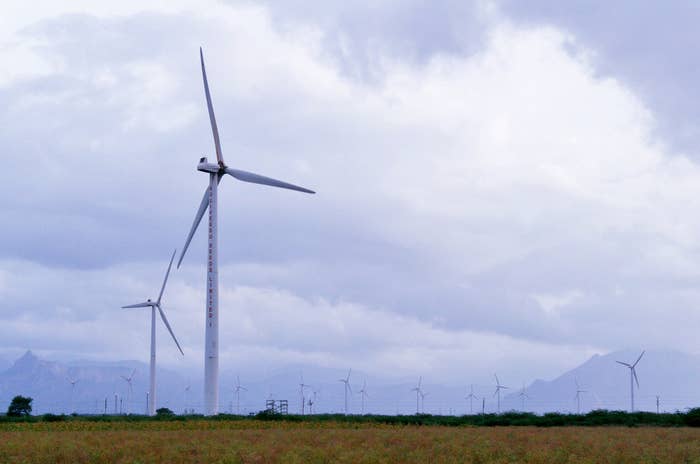Offering a bit of hope to a world facing a warming climate, scientists reported on Monday that a decade-plus increase in greenhouse gas emissions worldwide flattened out in the last two years.
The finding of a nearly flat increase in industrial carbon dioxide emissions, up just 0.6% last year, breaks a long-standing lockstep between economic growth and burning fossil fuels. This year looks poised to see a slight drop in emissions, even as the world economy is projected to grow more than 3%.
“The take-home message is that, for the first time, carbon dioxide emissions have stabilized, at least temporarily, while global gross domestic product grew robustly,” Stanford’s Robert Jackson, who led the Global Carbon Budget study, told BuzzFeed News. “It's a bit of good news.”
The report, published in the journal Nature Climate Change, looked at carbon dioxide emissions from burning fossil fuels such as coal, oil, and natural gas since 1990. Carbon dioxide is the big kahuna of greenhouse gases: It’s linked to 14 of the 15 hottest years on record coming in this century, with this year poised to break last year’s record. The report notes that only the global recession year of 2009 had seen a dent in a steady 2.4% yearly growth of carbon emissions since 2000.
A leading reason for the flattening is China, which is burning less coal, making less cement, and pushing to clean its air. China has also become the world’s leader in wind power, which grew globally last year to 370 gigawatts, up 51 gigawatts from 2013. That increase alone was more than the world’s total wind power capacity was a decade ago. Likewise, solar power grew to 178 gigawatts worldwide last year, a 4,800% increase since 2004.
“There’s no going back, renewables are here to stay,” Jackson said. “We can’t take our eye off the ball, but it is a glimmer of hope.”

Still, other energy experts called for caution in celebrating the emissions slowdown, news of which comes as world leaders negotiate a global climate agreement in Paris.
“It’s a little too early to pop the French champagne corks in Paris, declare victory, and come home over this,” Raymond Kopp of Resources for the Future told BuzzFeed News. “I would only feel confident some sort of corner had turned if other groups repeat these findings and we see it for another five years.”
In particular, the slowdown in the world’s commodity market might reverse if the global economy picks up, leading to China making more steel and cement while burning more coal. And India, where roughly 300 million people lack electricity, has made plans to purchase coal plants to help lift people out of poverty. So it might see emissions grow to rival China unless it turns to less polluting power.
One of the sub-plots of the Paris climate meeting has been resistance by India’s prime minister, Narendra Modi, to agree to limits on greenhouse gas emissions similar to those made by the U.S. and China. (Doubts have been raised about China’s emission data as well, after an August study found that its emissions varied depending the the quality of coal burned by the leading emitter of greenhouse gasses. Jackson said the new report accounted for the latest estimates of China’s emissions.)
“There are hundreds of coal-burning power plants under construction, often in developing countries with financing from Chinese firms,” emissions expert Steven Davis of the University of California, Irvine told BuzzFeed News by email. “Some of the places where coal is poised to boom have made vague (or no) pledges. Time will tell.”
